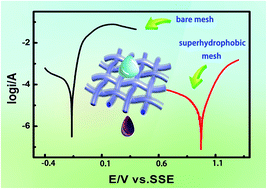Abstract: Frequent oil spillages and the industrial discharge of organic solvents have caused severe environmental and ecological damage. Besides, as another common phenomenon in industry, corrosion of various active metals is of great importance in deciding the service life of such materials. Therefore, for the sake of solving such problems, it is imperative, but also challenging, to find suitable materials with good performance. On the other hand, the complicated fabrication procedures generally hinder practical applications of superhydrophobic and superoleophilic materials. Here, we present a simple method for preparing a three-dimensional material based on a commercially available sponge and other substrates functionalized by depositing nanoscale polypyrrole (PPy) particles, which is followed by modification of a low-surface-energy material such as fluoroalkylsilane (FAS). Such superhydrophobic samples can efficiently separate oils and organic solvents from water and are endowed with good anti-corrosion properties of several metals to a greater extent as well. KeyWords Plus: OIL-WATER SEPARATION; ORGANIC-SOLVENTS; CARBON NANOTUBE; SPONGES; COPPER; GRAPHENE; REMOVAL; NANOSTRUCTURES; NANOCRYSTALS; ABSORPTION Published in RSC ADVANCES, 5 (130):107880-107888; 10.1039/c5ra19632a 2015
|
